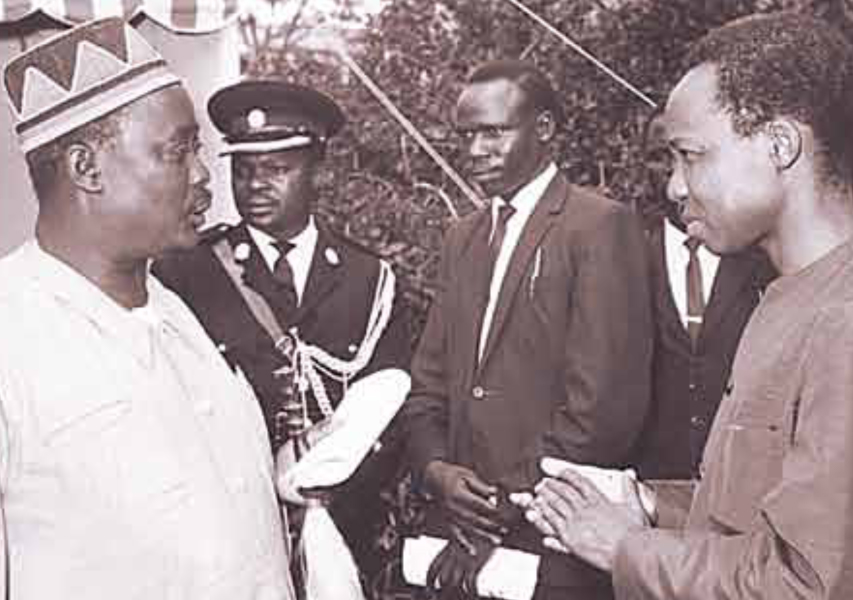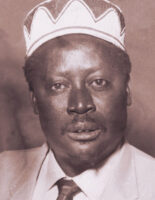
Oginga Odinga was, undoubtedly, the doyen of opposition politics in the colonial and the post-independence eras. Since the colonial times, he was known for his political and ideological consistency.
Odinga was a fearless leader. Unlike many politicians, Jaramogi, as his admirers fondly referred to him, would not compromise his ideals, notwithstanding the consequences. He was in the first Cabinet at independence in 1963 as Minister for Home Affairs. In 1964, when Kenya became a republic and Kenyatta the President, Odinga was appointed Vice-President and Minister for Home Affairs. But when he differed with the President in 1966, he resigned.
Indeed, Odinga had joined opposition politics early in his political career. In 1961, he made history as the first member of Kanu to be suspended (as vice-president) for “making statements with communistic tendencies and supporting non-Kanu candidates and the Kenya Action Group”.
Kanu chairman James Gichuru had announced the suspension after a one-hour meeting with secretary-general Tom Mboya.
Odinga believed socialism was the best way to serve the poor. He described it as “equalisation of opportunities” and called on the rich to extend a hand of generosity to the poor.
Born in 1911 and educated at Maseno and Alliance, mathematics and history were his best subjects. When hockey was introduced at Maseno, he played for his school. He then joined Makerere College for a diploma in education. His colleagues at Makerere included Godfrey Binaisa, who became Uganda’s Attorney-General and later caretaker President, and Walter Odede, Kenya’s first veterinary scientist.
After Makerere, Odinga landed a teaching job at his old school, Maseno, where the famous Carey Francis was the principal. Armed with a diploma, Odinga had hoped to pursue further studies in Britain, but Carey Francis told him: “The education you have is enough and you should now use it to help those who have none.”
The rebel in Odinga showed early. When he taught at Maseno, he took issue with the use of Christian names, and dropped his biblical name Adonijah in favour of Ajuma. He insisted on Oginga son of Odinga. By the time Carey Francis left Maseno, his fondness for Odinga had waned and he said his former student “was discontented with life and grumbled at everything”.
This was despite an earlier encouraging letter from Francis’ mother saying Adonijah’s future would be bright and he would grow up to be a great man. In his autobiography, Not Yet Uhuru, Odinga would write: “I loved teaching mathematics and the students knew that I placed no limit on the time I would spend helping them to solve problems. I became known as the Master of Mathematics. Even my sermons were said to be arithmetical and I told the students: ‘The word of God is like an arithmetical problem. The important thing is to find a solution’.’’
After a three-year stint at Maseno, Odinga moved to the Veterinary School, where he served as principal for four years. He then quit and tried his hand in business through the Luo Thrift and Trading Corporation that he had set up. Odinga and his colleagues also started the Luo Union movement to unite their community throughout East Africa.
He later joined politics and was elected to be the Nyanza African District and Sakwa Location Advisory Councils, which he served between 1947 and 1949. Odinga first met Kenyatta in 1948, introduced to him by Achieng’ Oneko. He met Kenyatta again in June, 1952, before going to address a KAU public rally. Three months later, on October 20, 1952, a State of Emergency was declared and 183 KAU leaders were arrested and detained.
During the Emergency, there were hints that Odinga would also be arrested and detained. But he survived, largely because he was the chairman of the Luo Thrift and Trading Corporation and Luo Union East Africa. However, security officers picked him up one night from his Kisumu home and drove him to the bush where they questioned him.He had just returned from an official trip to India, as the guest of Prime Minister Jawaharlal Nehru. There were claims that he had acquired arms to fight the colonial government.
Odinga was among leaders who called for the release of the jailed Kapenguria Six freedom fighters, including Kenyatta. Odinga argued that useful independence would be achieved only if Kenyans and the leaders united under one leader. With the freedom fighters incarcerated, their comrades mounted pressure on the colonial authorities to release them and hand over independence to Kenyans.
In 1957, Odinga was among eight Africans elected to the Legislative Council, which had previously been a citadel of white settler politics. They later formed the African Elected Members Organisation, with Odinga as chairman and Mboya as secretary. The others were Moi, Bernard Mate, Muliro, Ngala, Lawrence Oguda and Joseph Muimi.
In 1960, Kanu was formed and Odinga was elected vice-president, Gichuru president and Mboya secretary-general.
But differences in Kanu came to a head in 1966, when the party’s constitution was changed to provide for eight vice-presidents (one each for the eight provinces) rather than one. This was a clipping of Odinga’s wings. The vice-presidents were Moi (Rift Valley), Gichuru (Central), Kibaki (Nairobi), Lawrence Sagini (Nyanza), Eric Khasakhala (Western), Jeremiah Nyagah (Eastern) and Mohamud Jubat (North-Eastern). But Odinga could not take it. He resigned as Vice-President both of the country and of the party, quit Kanu and formed the KPU. Among those who defected with him were Oneko, the Minister for Information, Broadcasting and Tourism, and former detainee Bildad Kaggia, MP for Kandara, who was elected KPU vice-president.

Odinga and Kenyatta’s relations soured thereafter and worsened in 1969, when they clashed at a public function in Kisumu, during the opening of the Nyanza Provincial General Hospital funded by the Union of Soviet Socialist Republics, which the residents nicknamed “Russia”.
KPU supporters stoned the presidential motorcade, leading to the shooting of scores of people by the presidential guard, and detention of Odinga and his KPU colleagues. He was released from detention in 1971 and rejoined Kanu. But his woes did not end. In 1977, he was barred from contesting the Kanu vice-chairmanship in planned elections that were, however, postponed at the eleventh hour.
When Kenyatta died in 1978 and Moi took over, Odinga was appointed chairman of the Cotton Lint and Seed Marketing Board in 1980. This was seen as an attempt by Moi to rehabilitate Odinga from the political cold. But the honeymoon did not last long. The leader of the opposition ran into trouble for speaking his mind at a public rally in Mombasa, where he referred to Kenyatta as “a land grabber”.
There was an outcry from his critics and leaders from all walks of life. Moi dismissed him from the board. Expelling Odinga from Kanu in May, 1980, the President accused him of tarnishing the Government’s name when he travelled abroad.Odinga would have made it back to Parliament in the 1980 by-election when his ally and Bondo MP Hezekiah Ougo stepped down in his favour. But the controversial remark came at a time when Moi was consolidating his power and needed full support of Kenyatta’s supporters.
In 1982, Odinga and the outspoken Kitutu Masaba MP George Anyona were in the process of forming a party to rival Kanu.
The two had been expelled from Kanu and they made it public that they were tired of being in the political cold. But Kanu nipped their plans in the bud when the Constitution was amended making Kenya a one-party State. Meanwhile, Odinga was placed under house arrest, while his son Raila and Anyona were detained without trial. Odinga’s expulsion from the only registered party meant that he could not participate in politics and he was locked out for another decade.

In 1990, the doyen of oppositionists called an international press conference and announced his intentions to form an opposition party. In February, 1991, Odinga attempted to register the National Democratic Party (NDP) without success. This led to the formation of a pressure group, Forum for the Restoration of Democracy (Ford), which was popular among Kenyans. In December, 1991, the 1982 amendment making Kenya a one-party State was repealed and Ford and other parties were registered, with Odinga as interim chairman.
But in 1992 Ford split into two — Ford-Kenya led by Odinga and Ford-Asili led by former Cabinet Minister and Kiharu MP Kenneth Matiba. In that year’s General Election, the opposition parties, including Mwai Kibaki’s Democratic Party, lost to Moi’s Kanu. Matiba came second, Kibaki third and Odinga fourth. But he was elected the MP for Bondo, a return to the august House after a 23-year hiatus.
Asked by a visiting British journalist in 1959 what he thought of the rising star of trade unionist-cum-politician Tom Mboya, then the Legco member for Nairobi, Odinga had said: “He is a very brilliant young man who might break his neck quickly because of his flamboyance!”
The veteran politician said he was a democrat and could disagree with friend and foe alike, but that he did not keep grudges. His aides remember him telling his son, Raila, off in 1993 for opposing Kanu’s decision to field a candidate in Mombasa’s Kisauni by-election against Ford-Kenya. The older Odinga said: “There is no reason why Kanu should not field a candidate against Ford-Kenya because politics is like football — the best team wins!” Raila is today the Prime Minister. Odinga’s elder son Oburu Oginga, is an Assistant Minister for Finance.
In a farewell address to Parliament on December 9, 1993, before MPs broke for the Christmas holiday, Odinga, the Leader of the Official Opposition in Parliament, spoke as if he had a premonition that his time had come: “I want to leave you (MPs) with one thing: Please make this House responsible. I want our people on the other side (Kanu) to also make this House responsible. We all belong to Kenya and we should not abuse this country.”
Odinga died in January, 1994, and was buried in his rural home in Bondo. He had four wives and 17 children.
